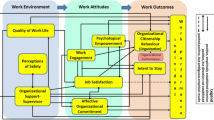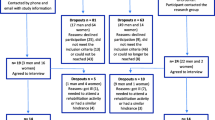Abstract
Purpose
To investigate the association between the perception of client-related work tasks and the experience of meaning of work among eldercare workers in the Danish eldercare sector.
Methods
We used baseline and follow-up questionnaire data from 3,985 female eldercare workers. The eldercare workers’ perception of the client-related work tasks was measured by six items. Meaning of work was measured by a three-item scale. General linear modelling was used to investigate the association between the client-related work tasks at baseline and experience of meaning of work at follow-up adjusted for job title, type of workplace, and age.
Results
When care workers experience to have time to be flexible in the care provision and to be able to talk and socialize with the elderly, they are significantly more likely to experience meaning of work at follow-up than care workers who occasionally or rarely have this experience. Care workers who frequently experience to have to end a visit prematurely are significantly less likely to experience meaning of work at follow-up than care workers who rarely experience this. Experiences of having time to perform other than pre-planned tasks and to have insufficient time have little impact on experience of meaning of work at follow-up.
Conclusion
This study indicates that to enhance the experience of meaning of work among eldercare workers, improvements of the relational aspects of care work, i.e. the possibilities to talk, socialize, and involve the elderly in the care provision, should be considered.
Similar content being viewed by others
References
Arnold KA, Turner N, Barling J, Kelloway EK, Mckee MC (2007) Transformational leadership and psychological well-being: the mediating role of meaningful work. J Occup Health Psychol 12:193–203
Aronsson G, Astvik W, Thulin AB (1998) Home-care workers: work conditions and occupational exclusion: a comparison between carers on early-retirement and regular pensions. Home Health Care Serv Q 17:71–91
Astvik W, Aronsson G (1994) Hälsomässiga, psykologiska och organisatoriska aspekter på vårdbiträdesarbetet i hemtjänsten [Health-related, psychological and organizational aspects of nursing assistants working in home care]. Arbete hälsa [Work and health] 32:20–48
Brown SP (1996) A meta-analysis and review of organizational research on job involvement. Psychol Bull 120:235–255
Clausen T (2009) Psychosocial work characteristics, positive work-related states, and labour market outcomes. Ph. D. Dissertation. Danish Research school of Psychology, Copenhagen
Clausen T, Borg V (2010) Do positive work-related states mediate the association between psychosocial work characteristics and turnover? A longitudinal analysis. Int J Stress Manag 17:308–324
Clausen T, Borg V (In Press) Job demands, job resources and meaning at work. J Manag Psychol
Clausen T, Christensen KB, Borg V (2010) Positive work-related states and long-term sickness absence: a study of register-based outcomes. Scand J Publ Health 38:51–58
Colombo F, Llena-Nozal A, Mercier J, Tjadens F (2011) Help wanted? Providing and paying for long-term care, OECD health policy studies. OECD Publishing, Geneva
Dormann C, Zapf D (2002) Social stressors at work, irritation, and depressive symptoms: accounting for unmeasured third variables in a multi-wave study. J Occup Organ Psychol 75:33–58
Elwer S, Alex L, Hammarstrom A (2010) Health against the odds: experiences of employees in eldercare from a gender perspective. Qual Health Res 20:1202–1212
Harper S (2010) The capacity of social security and health care institutions to adapt to an ageing world. Int Soc Secur Rev 63:3–4
Keyes CLM (2007) Promoting and protecting mental health as flourishing—a complementary strategy for improving National Mental Health. Am Psychol 62:95–108
Leiter MP, Harvie P, Frizzell C (1998) The correspondence of patient satisfaction and nurse burnout. Soc Sci Med 47:1611–1617
Lewinter M (2003) Reciprocities in caregiving relationships in danish eldercare. J Aging Stud 17:357–377
Liveng A (2006) Social-og sundhedshjælperelevers omsorgsorientering og hjælperarbejdets modsætningsfyldte krav [The orientation of social and health helper assistant trainees towards caring and the contradictory demands of the work]. Tidsskr arb liv 8(1):32–48
Pejtersen JH, Kristensen TS, Borg V, Bjorner JB (2010) The second version of the copenhagen psychosocial questionnaire. Scand J Public Health 38:8–24
Podsakoff PM, Mackenzie SB, Lee JY, Podsakoff NP (2003) Common method variance in behavioral research: A critical review of the literature and recommended remedies. J Appl Psychol 88:879–903
Pratt MG, Ashforth BE (2003) Fostering meaningfulness in working and at work. In: Cameron KS, Dutton JE, Quinn RE (eds) Positive organizational scholarship. Foundations of a new discipline. Berett-Kohler Publishers, San Francisco, pp 309–327
Szebehely M (2006) Omsorgsvardag under skiftande organisatoriske villkor: En jämförande studie av den nordiska hemtjänsten. Tidsskr arb liv 8:49–66
Trydegård GB (2005) Äldreomsorgspersonalens arbetsvillkor i Norden—en forskningsöversikt [Working conditions for care workers in the Nordic countries. A research overview] In: Szebehely M (eds) Äldreomsorgsforskning i Norden [Research on eldercare in the Nordic countries]. Norden, Copenhagen
Tufte P (2011) Hvad er meningen?—Arbejdspraksis og mening i arbejdet i den danske ældrepleje [What’s the meaning? Work practice and meaning of work in the Danish eldercare sector]. Tidsskr arb liv 13(2):28–41
Tufte P, Clausen T, Borg V (2008) Oplevelser af psykisk nedslidning blandt seniormedarbejdere i den danske ældrepleje [Experiences of attrition of psychological resources among senior employees in the Danish eldercare sector]. Tidsskr arb liv 10(2):78–92
Wrzeniewski A (2003) Finding positive meaning in work. In: Cameron KS, Dutton JE, Quinn RE (eds) Positive organizational scholarship. Foundations of a new discipline. Berett-Kohler Publishers, San Francisco, pp 309–327
Conflict of interest
The authors declare that they have no conflict of interest.
Author information
Authors and Affiliations
Corresponding author
Rights and permissions
About this article
Cite this article
Tufte, P., Clausen, T. & Nabe-Nielsen, K. Client-related work tasks and meaning of work: results from a longitudinal study among eldercare workers in Denmark. Int Arch Occup Environ Health 85, 467–472 (2012). https://doi.org/10.1007/s00420-011-0692-x
Received:
Accepted:
Published:
Issue Date:
DOI: https://doi.org/10.1007/s00420-011-0692-x




